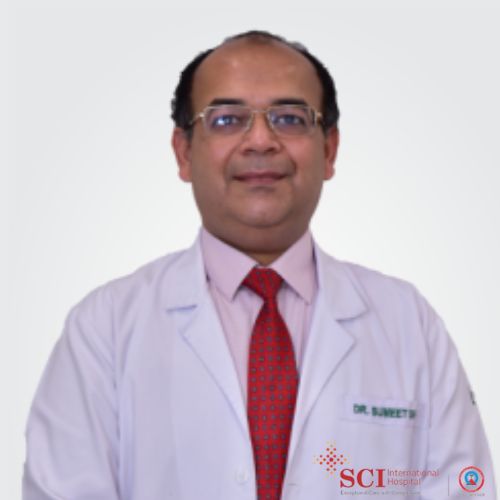That sharp, nagging pain in your lower right belly can be frightening. It is something you should never ignore. This pain is often a sign of appendicitis. This condition is a medical emergency and needs fast treatment. The standard solution is a surgery to remove the appendix. This procedure is called an appendectomy. In Delhi, SCI hospitals provide expert care for this surgery. They use modern techniques to ensure your safety. This helps make the experience less painful and gets you back on your feet sooner.
We Are Rated
Consult Now
Appendicitis happens when your appendix becomes swollen and filled with infection. The appendix is a small pouch shaped like a finger. It is connected to your large intestine, usually on the lower right side of your tummy. The exact purpose of the appendix is still a bit of a mystery to science. But when it gets blocked and swells with pus, it causes appendicitis. This is a serious problem that requires immediate surgery to take out the appendix.
If appendicitis is not treated quickly, the appendix can burst. This can cause a dangerous infection to spread inside your belly. This infection of the belly lining is called peritonitis. It can be deadly. In fact, appendicitis is one of the most common reasons people need emergency surgery on their abdomen.
Your appendix usually gets inflamed because its inner lining gets blocked. This blockage creates a space for an infection to start. Once blocked, germs like bacteria can multiply inside the appendix. This makes it swell up and fill with pus.
Here are some common reasons for a blockage:
It is critical to remove the appendix as soon as a doctor diagnoses you with appendicitis. This is treated as a medical emergency. The big question is, why the rush? The answer is the high risk of the appendix bursting. A rupture can happen very fast, sometimes in just two or three days after symptoms begin.
The most important sign to watch for is a sudden pain. It often begins near your belly button and then shifts to the lower right part of your belly. This pain tends to become sharp and constant, getting worse over several hours. Other signs that you need urgent medical attention include a loss of appetite, feeling sick (nausea), throwing up (vomiting), and a low-grade fever. Removing the appendix immediately through surgery is the standard and safest treatment. This prevents serious problems like a widespread belly infection (peritonitis) or a severe body-wide reaction to infection (sepsis).
An appendectomy is the name of the surgery to remove an inflamed appendix. It is the most common and accepted treatment for appendicitis. The main purpose of the operation is to take out the infected appendix before it has a chance to burst. Surgeons can perform an appendectomy in two main ways.
Laparoscopic Appendix Removal: The Modern, Minimally Invasive Method
`A laparoscopic appendectomy is the most common way this surgery is done today. It is a "minimally invasive" surgery. This means it involves very small cuts instead of one large one. The surgeon makes a few tiny openings in your belly. Through one opening, they insert a thin tube with a camera, called a laparoscope.
This camera sends a magnified view of your insides to a video screen. The surgeon then uses small, specialized tools through the other cuts to carefully detach and remove the appendix. The benefits of this modern method are significant.
Traditional Open Surgery: When is it Necessary?
An open appendectomy involves the surgeon making one larger cut in the lower right area of your belly to remove the appendix. This traditional method might be necessary in certain cases. For instance:
When you are facing an appendix removal, it helps to know what to expect. Here is a general idea of how the surgery process works.
What Doctor Removes the Appendix?
A general surgeon is the type of doctor who performs an appendectomy. General surgeons are trained to do many kinds of common surgeries, with a special focus on the organs in the belly area, like the appendix.
How Long Does the Appendix Removal Surgery Last?
A routine appendectomy is usually a quick operation. A laparoscopic surgery often takes about an hour to complete. An open surgery might take about the same amount of time, but it could take longer if there are complications, such as a burst appendix that requires the surgeon to clean out the inside of the abdomen.
How Long Will I Stay in the Hospital?
Your hospital stay depends on the kind of surgery you had and how severe your appendicitis was.
Getting better after an appendectomy takes a little time and patience. Knowing what is normal during recovery can make the process smoother.
Dietary Restrictions After Your Operation
It is normal to have some side effects while you heal. These might include:

MBBS, MS - General Surgery, DNB - General Surgery, General Surgeon, Laparoscopic Surgeon, Bariatric Surgeon

MBBS, MS - General Surgery, General Surgeon
An appendectomy is a very safe surgery. But like any operation, there are some risks. Possible complications include:
The cost of an appendix removal surgery in Delhi can change based on several factors. It is hard to give one price that fits every situation.
Factors Influencing the Final Cost
When dealing with a medical emergency, you shouldn't have to worry about confusing bills. SCI Hospital also has dedicated staff to help you with your health insurance claims. They can help you understand the costs and get the most from your coverage.
Picking a hospital for any surgery is a major decision. When it comes to an appendectomy, patients should look for a place with experienced surgeons who are skilled in modern, minimally invasive techniques. It is also important that the hospital provides excellent care and support for patients and their families. Taking the time to consider what a hospital offers is a wise step toward ensuring you receive the best possible treatment.
The medical term for removing the appendix is appendectomy. You might also see it spelled as appendicectomy.
For the vast majority of people, there are no long-term side effects from having their appendix removed. The appendix is not considered a vital organ, which means you can live a completely normal and healthy life without it.
Yes, for nearly all cases of acute appendicitis, surgery is necessary. An infected appendix will not heal on its own. If left untreated, it is very likely to burst. A burst appendix spills infection throughout the abdomen, which can lead to a deadly condition called peritonitis.
No, you cannot elect to have your appendix removed without a medical reason. An appendectomy is a major surgical procedure that carries real risks. These include potential problems from anesthesia, bleeding, and infection.
Consult Now
